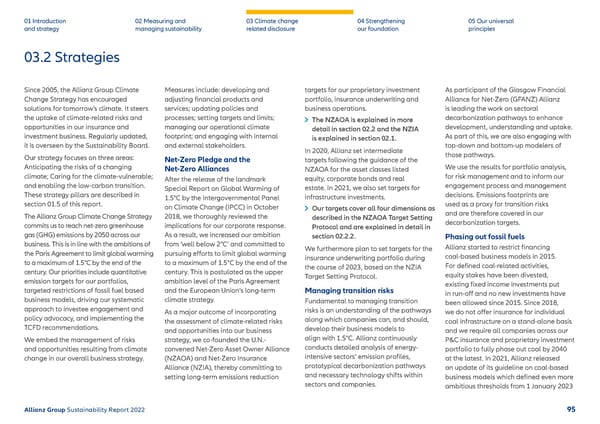01 Introduction and strategy 02 Measuring and managing sustainability 03 Climate change related disclosure 04 Strengthening our foundation 05 Our universal principles 03.2 Strategies Since 2005, the Allianz Group Climate Change Strategy has encouraged solutions for tomorrow’s climate. It steers the uptake of climate-related risks and opportunities in our insurance and investment business. Regularly updated, it is overseen by the Sustainability Board. Our strategy focuses on three areas: Anticipating the risks of a changing climate; Caring for the climate-vulnerable; and enabling the low-carbon transition. These strategy pillars are described in section 01.5 of this report. The Allianz Group Climate Change Strategy commits us to reach net-zero greenhouse gas (GHG) emissions by 2050 across our business. This is in line with the ambitions of the Paris Agreement to limit global warming to a maximum of 1.5°C by the end of the century. Our priorities include quantitative emission targets for our portfolios, targeted restrictions of fossil fuel based business models, driving our systematic approach to investee engagement and policy advocacy, and implementing the TCFD recommendations. We embed the management of risks and opportunities resulting from climate change in our overall business strategy. Measures include: developing and adjusting financial products and services; updating policies and processes; setting targets and limits; managing our operational climate footprint; and engaging with internal and external stakeholders. Net-Zero Pledge and the Net-Zero Alliances After the release of the landmark Special Report on Global Warming of 1.5°C by the Intergovernmental Panel on Climate Change (IPCC) in October 2018, we thoroughly reviewed the implications for our corporate response. As a result, we increased our ambition from ‘well below 2°C’ and committed to pursuing efforts to limit global warming to a maximum of 1.5°C by the end of the century. This is postulated as the upper ambition level of the Paris Agreement and the European Union’s long-term climate strategy. As a major outcome of incorporating the assessment of climate-related risks and opportunities into our business strategy, we co-founded the U.N.- convened Net-Zero Asset Owner Alliance (NZAOA) and Net-Zero Insurance Alliance (NZIA), thereby committing to setting long-term emissions reduction targets for our proprietary investment portfolio, insurance underwriting and business operations. The NZAOA is explained in more detail in section 02.2 and the NZIA is explained in section 02.1. In 2020, Allianz set intermediate targets f ollowing the guidance of the NZAOA for the asset classes listed equity, corporate bonds and real estate. In 2021, we also set targets for infrastructure investments. Our targets cover all four dimensions as described in the NZAOA Target Setting Protocol and are explained in detail in section 02.2.2. We furthermore plan to set targets for the insuranc e underwriting portfolio during the course of 2023, based on the NZIA Target Setting Protocol. Managing transition risks Fundamental to managing transition risks is an understanding of the pathways along which companies can, and should, develop their business models to align with 1.5°C. Allianz continuously conducts detailed analysis of energy- intensive sectors’ emission profiles, prototypical decarbonization pathways and necessary technology shifts within sectors and companies. As participant of the Glasgow Financial Alliance f or Net-Zero (GFANZ) Allianz is leading the work on sectoral decarbonization pathways to enhance development, understanding and uptake. As part of this, we are also engaging with top-down and bottom-up modelers of those pathways. We use the results for portfolio analysis, for risk management and to inform our engagement pr ocess and management decisions. Emissions footprints are used as a proxy for transition risks and are therefore covered in our decarbonization targets. Phasing out fossil fuels Allianz started to restrict financing coal-based business models in 2015. For defined coal-related activities, equity stakes have been divested, existing fixed income investments put in run-off and no new investments have been allowed since 2015. Since 2018, we do not offer insurance for individual coal infrastructure on a stand-alone basis and we require all companies across our P&C insurance and proprietary investment portfolio to fully phase out coal by 2040 at the latest. In 2021, Allianz released an update of its guideline on coal-based business models which defined even more ambitious thresholds from 1 January 2023 Allianz Group Sustainability Report 2022 95
 Sustainability Report 2022 | Allianz Page 95 Page 97
Sustainability Report 2022 | Allianz Page 95 Page 97